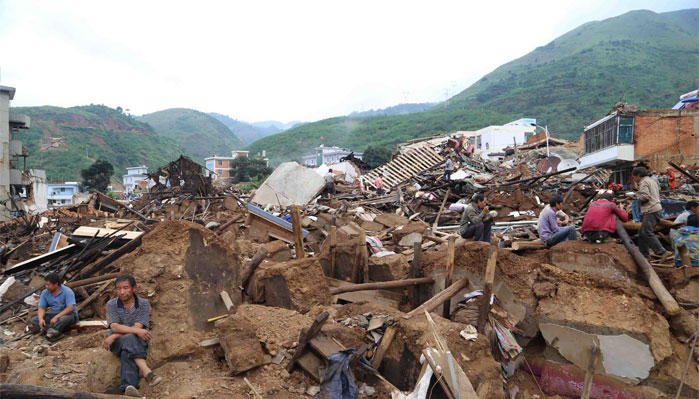Earthquake victims sit amid the debris of collapsed houses in Ludian county in Zhaotong, southwest China's Yunnan province
AFP/ Longtoushan
Rescuers laid out bodies in the streets Monday after at least 398 people were killed by an earthquake in China, leaving the idyllic mountain landscape littered with scenes of devastation and sparking a huge rescue effort.
More than 18,000 rescuers were deployed in the disaster zone in the southwestern province of Yunnan, where nearly 80,000 houses were destroyed and 124,000 more seriously damaged, the official news agency Xinhua said.
In Longtoushan, at the epicentre of the quake, a volunteer gently placed the body of a one-year-old infant next to an eight-year-old, near other small corpses.
Each one was wrapped in dirty blankets and old clothes tied with string to anything resembling a stretcher -- a ladder, two branches, or planks of wood -- as rain fell from darkened skies.
"There are about 70 to 80 bodies here," one women shouted helplessly.
"We cannot move them because the roads are all blocked," said a man, as more bodies were recovered from the rubble and placed on the dirty pathway, an AFP reporter saw.
The village sits at the end of a road from the urban centre of Ludian that winds through treacherous cliffs with signs of landslides -- fresh dirt, rocks and huge boulders -- littering the concrete. Along the route were stationed hundreds of army vehicles, ambulances and trucks loaded up with supplies.
The US Geological Survey (USGS) reported Sunday's quake at a magnitude of 6.1 and said it struck at a relatively shallow depth of 10 kilometres (six miles).
The Yunnan province civil affairs office said 398 people had been confirmed killed and 1,801 injured.
A total of 18,000 emergency personnel, including 11,000 police and firefighters, and 7,000 soldiers and armed police had been mobilised, Xinhua said.
Equipment brought to the area included life detection instruments and excavating tools.
"They are also battling the continual downpour that has brought down the temperature in the remote area and made shortages of food and medicine even more pernicious," Xinhua added.

